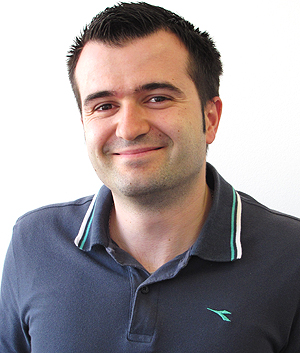ICSI Collaborates with Italian Research Center on Internet of Things, Big Data, and End User Computing Research
This year, ICSI began collaborating with the Research Center on Computer Platform Engineering (known as CIPI), a joint project of the Universities of Genoa and Padua, on the service composition paradigm for distributed applications. This paradigm is a way of visualizing and organizing the relationships among services that, together, make up a larger service composed by simple basic functionalities (i.e., web APIs) belonging to different domains such as social networks, e-commerce, news, and government data. Researchers from the center will visit ICSI to study how this paradigm can be applied to two areas, the Internet of Things (IoT), a network in which most physical objects we interact with on a daily basis will one day be connected, and Big Data. Michele Stecca, a CIPI researcher, will spend his postdoctoral fellowship working at ICSI on different components of the project.
 While working toward his PhD at the University of Genoa, Michele was a project leader for the OPUCE project, led by telecommunication services providers and funded by the European Union. OPUCE, or the Open Platform for User-centric Creation and Execution, created a service delivery platform that allows users to integrate telecommunication and web services for developing applications. In 2011, he received his PhD and began working at CIPI on iCore, another research project funded by the European Union. iCore research focuses on defining an horizontal platform for the IoT. For iCore, and CIPI’s role in it, real objects are represented in a network as abstract representations, or virtual objects. Each corresponds to a small, less complex service in a composite service network. In this way, IoT applications are visualized as composite services and are organized according to the service composition paradigm. The iCore project studies how to orchestrate these agents.
While working toward his PhD at the University of Genoa, Michele was a project leader for the OPUCE project, led by telecommunication services providers and funded by the European Union. OPUCE, or the Open Platform for User-centric Creation and Execution, created a service delivery platform that allows users to integrate telecommunication and web services for developing applications. In 2011, he received his PhD and began working at CIPI on iCore, another research project funded by the European Union. iCore research focuses on defining an horizontal platform for the IoT. For iCore, and CIPI’s role in it, real objects are represented in a network as abstract representations, or virtual objects. Each corresponds to a small, less complex service in a composite service network. In this way, IoT applications are visualized as composite services and are organized according to the service composition paradigm. The iCore project studies how to orchestrate these agents.
iCore has four application domains; Michele worked on the smart city domain, which aimed to integrate data provided by objects in a city to present information to residents. The activity was carried out with the Fiat Research Center on smart transportation and smart parking, combining data available from cars and users (GPS, speed, and fuel data, for example) and public services information (data from parking structures, for example) to provide recommendations for the closest available parking spot.
While at ICSI, he works on the application of the service composition paradigm to spreadsheets where the final objective is to link many spreadsheets together in a larger composite spreadsheet, allowing users to share and play with data. This initiative is funded by SpreadSheet Space Inc., a start-up launched by CIPI. A composite spreadsheet allows ordinary users with only basic skills to perform sophisticated data analyses, supporting the fusion of Big Data analyses with End User computing.
Michele is working on ways to visualize a composite spreadsheet in a graph that shows how its smaller component spreadsheets are linked and related to each other. This will allow an administrator, for example, to see who has shared what with whom. CIPI is also investigating how spreadsheets can be used to process Big Data. Michele supervises a master’s student at CIPI who is studying how to use spreadsheets as an interface for Big Data using Hadoop.
SpreadSheetSpace allows regular users to deeply understand large amounts of data. Says ICSI alum Massimo Maresca, who supervises the project, “Our potential is huge because the world uses Excel.”
Massimo is the head of the Scientific Office of the Italian Consulate in San Francisco and a University of Genoa professor. He first visited ICSI’s Realization Group, which developed massively parallel systems, as a postdoc in the early 1990s. He soon switched his attention to distributed networks, an area of research led at ICSI by Professor Domenico Ferrari in the Networking Group. Massimo went on to work at the University of Genoa, first as an assistant professor and later as an associate professor, while continuing to visit ICSI. In 1995, he moved to the University of Padua, maintaining close ties with collaborators in Genoa. These collaborations led to the foundation of the Research Center on Computer Platform Engineering (CIPI).
The center’s research focuses on platforms – standard sets of functionalities for performing services. Specifically, the center identifies and characterizes platforms, and researches how to connect them so that they can cooperate to perform complex tasks.
